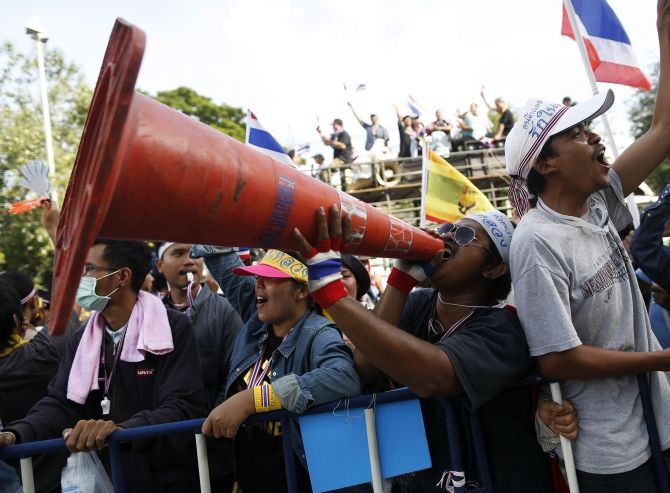 Defiant Thai protesters on Thursday cut power supply to the national police headquarters, ignoring a plea by beleaguered Prime Minister Yingluck Shinawatra to end their anti-government rallies and negotiate after she emerged unscathed from a no-confidence debate.
Defiant Thai protesters on Thursday cut power supply to the national police headquarters, ignoring a plea by beleaguered Prime Minister Yingluck Shinawatra to end their anti-government rallies and negotiate after she emerged unscathed from a no-confidence debate.
Buoyed by her victory in parliament, she considered an emergency decree to combat the defiance of thousands of protesters occupying ministries and government offices since Sunday in the biggest mass rallies in three years.
Protesters snapped the electricity supply to the national police headquarters, calling on the government to step down and replace it with an unelected "people's council" - a demand Yingluck said was impossible under the constitution.
Earlier in the day, Prime Minister Yingluck comfortably survived the no-confidence vote after lawmakers in the ruling party-dominated lower house overwhelmingly rejected the censure motion by 297-134 votes.
The censure motion was held after two days of showdown between the opposition Democrat Party and the ruling coalition led by Yingluck's Pheu Thai party.
The opposition filed the motion alleging widespread corruption in the government and accusing Yingluck of acting as a puppet for her fugitive brother, former premier Thaksin Shinawatra who was ousted in a coup in 2006.
Yingluck denied the accusations and urged protesters to end rallies in a televised national address after the vote. "I propose to protesters to stop protesting and leave government offices so the civil service can move forward," she said.
The government does not want confrontation and is ready to cooperate with everybody to find a solution," she said. Protesters, led by former lawmaker Suthep Thaugsuban, have occupied the ministry of finance and are holed up in a sprawling government office complex where they camped overnight. They also showed up at the defence and education ministries.
Yingluck has ruled out the use of force to end the protests, seeking to avoid a repeat of the bloodshed seen in 2010 which left more than 90 people dead and nearly 1,900 wounded and deepened the country's political divide.
But the sources said the government would pressure the protesters to vacate all state offices and could also step up measures by declaring an emergency decree if its call goes unheeded, the Bangkok Post quoted sources as saying.
The protests have caused growing international concern, with united Nations chief Ban Ki-moon on Thursday urging all sides to "refrain from the use of violence and to show full respect for the rule of law and human rights".
On Wednesday, protesters entered a major government complex in the northern outskirts of the capital and also forced staff to leave the justice department's besieged department of special investigations.
On Monday, Yingluck invoked the Internal Security Act, which gives authorities additional powers to block routes, impose a curfew, ban gatherings and carry out searches. India and over 20 countries have issued warning to their nationals in Thailand to be cautious of the ongoing mass protests that has plunged the divided nations into deep political chaos.
The Indian Embassy in a notice yesterday cautioned Indian tourists and residents to take usual precautions for personal safety and advised them to monitor the situation in Bangkok through media reports, tour operators and their hotels
More than 20 countries, including the United States, the United Kingdom, France, China, Italy, Japan, South Korea, Brazil, have also issued special travel advice urging their citizens visiting Thailand to be cautious.











 © 2025
© 2025